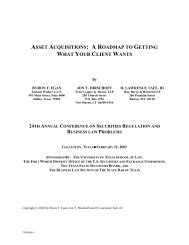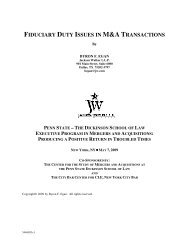Maximizing Reimbursement Under Texas Prompt Pay Laws (cont
Maximizing Reimbursement Under Texas Prompt Pay Laws (cont
Maximizing Reimbursement Under Texas Prompt Pay Laws (cont
You also want an ePaper? Increase the reach of your titles
YUMPU automatically turns print PDFs into web optimized ePapers that Google loves.
<strong>Maximizing</strong> <strong>Reimbursement</strong> <strong>Under</strong> <strong>Texas</strong> <strong>Prompt</strong> <strong>Pay</strong> <strong>Laws</strong> (<strong>cont</strong>.)Senate Bill 418 provides a graduated penalty for claims that are not timely paid.Physicians and providers are entitled to the following penalties for late payment ofclaims in addition to the <strong>cont</strong>racted rates:• If a claim is paid between the 1st and 45th day following the applicablepayment period, the physician or provider is entitled to receive a penaltyequal to the lesser of 50% of the difference between the <strong>cont</strong>racted rate andbilled charges, or $100,000. 4• If a claim is paid between the 46th and 90th day following the applicablepayment period, the physician or provider is entitled to receive a penaltyequal to the lesser of 100% of the difference between the <strong>cont</strong>racted rate andbilled charges, or $200,000.• If the claim is paid on or after the 91st day following the applicable paymentperiod, the physician or provider is entitled to receive a penalty equal to 100%of the difference between the <strong>cont</strong>racted rate and billed charges plus 18%annual interest on the penalty amount.If an HMO or preferred provider carrier underpays a claim, the followingpenalties apply:• If the balance of a claim is paid between the 1st and 45th day following theapplicable payment period, the physician or provider is entitled to receive apenalty equal to the lesser of 50% of the underpaid amount, or $100,000.• If the balance of a claim is paid between the 46th and 90th day following theapplicable payment period, the physician or provider is entitled to receive apenalty equal to the lesser of 100% of the underpaid amount, or $200,000.• If the balance of a claim is paid on or after the 91st day following the applicablepayment period, the physician or provider is entitled to receive apenalty equal to 100% of the underpaid amount plus 18% annual interest onthe penalty amount.Applying House Bill 610Contracted providers that have “Evergreen” <strong>cont</strong>racts or <strong>cont</strong>racts that wereentered into or renewed prior to August 16, 2003, must look to House Bill 610for guidance on claims submission and payment. Like Senate Bill 418, the promptpay provisions of House Bill 610 apply only to the submission of clean claims.<strong>Under</strong> House Bill 610, however, the definition of “clean claim” is broader andallows HMOs and preferred provider carriers to make additional requirements inorder for a claim to be considered “clean.” A physician or provider submits a“clean claim” under House Bill 610 by providing the required data elements specifiedby the rule along with any attachments or additional elements requested by theHMO or preferred provider carrier of which the physician or provider has beenproperly notified. HMOs and preferred provider carriers have much more latitudeto make their own determinations as to what constitutes a clean claim under HouseBill 610 and many physicians and providers have been surprised to learn that theprompt pay provisions do not apply to many of their claims because the claims failto include all of the data elements required by the rule (CMS-1500 field 15, forexample) or they do not include the correct attachments or additional dataelements required by a particular insurer. Physicians and providers must make surethey are aware of the clean claim requirements for each of their <strong>cont</strong>racts withHMOs or preferred provider carriers in order to qualify for prompt payment ofclaims under House Bill 610.Once a clean claim has been submitted, House Bill 610 requires the claim to bepaid or denied within 45 days after the HMO or preferred provider carrier receivesthe claim. If a claim is audited, 85% of the <strong>cont</strong>racted rate of the audited portion ofthe claim must be paid within the statutory payment period. If a clean claim is notpaid or denied within the statutory time period, HMOs and preferred providercarriers are liable for 100% of the billed charges 5 or the <strong>cont</strong>racted penalty rate.Though most physicians and providers prefer the prompt pay provisions ofSenate Bill 418, reimbursement can be maximized under either law by understandingand complying with the nuances of each. Awareness of what is owed,when it should be paid and what penalties are available will help physicians andproviders collect every dollar owed under the prompt pay laws.If you have any further questions concerning <strong>Texas</strong> prompt pay laws, pleasefeel free to call Karen Pyatt at (214) 953-6125 or Mary Emma Karam at (214)953-6041.1.A recent case in the United States District Court in the Northern District of <strong>Texas</strong> held that ERISA did not preempt a prompt pay claimbrought against Blue Cross Blue Shield of Arkansas, the payor of a fully insured ERISA plan. See Baylor University Medical Center v.Arkansas Blue Cross Blue Shield, Civil Action No. 3:03-CV-2084-G (N.D. Tex. Jan. 9, 2004).2.The “Verification” and “Effect of Filing a Clean Claim” provisions of Senate Bill 418 apply to non-<strong>cont</strong>racted physicians providingservices on or after August 16, 2003: a) on referral from an HMO, PPO or preferred provider because the services were not reasonablyavailable in-network; or b) that are emergency care services.3.Senate Bill 418 and House Bill 610 have 21-day adjudication periods for pharmacy claims.4.“Billed Charges” under Senate Bill 418 are the charges for medical or health care services included on a claim submitted by aphysician or provider.5.“Billed charges” under House Bill 610 are “the charges made by a physician or provider who renders or furnishes services,treatments, or supplies provided the charge is not in excess of the general level of charges made by other physicians or providerswho render or furnish the same or similar services, treatments, or supplies to persons in the same geographical area and whoseillness or injury is comparable in nature or severity. In the event of a case rate agreed to between the physician or provider and theHMO or preferred provider carrier, billed charges shall be considered the higher of the case rate or billed charges.”Impact of the Sarbanes-Oxley Act of 2002 on Privately-Held, For-Profit Healthcare CompaniesJAMES S. RYAN, IIIThe impact on public companies of the Sarbanes-Oxley Act of 2002 (the “SOA”) has been widelypublicized. The provisions of the SOA have beenparticularly noted in the for-profit healthcarecommunity because, in connection with the criminalinvestigation ofHealthSouthCorporationand several ofits officers, the federal governmentfor the first time brought criminalcharges based on the financialstatement certification provisions ofSection 906 of the SOA. Mostprovisions of the SOA specificallyapply to publicly held corporations, although SOA criminal provisionsconcerning obstruction of justice through document destruction andretaliation apply directly to privately held and nonprofit concerns. Certainprovisions of the SOA that specifically apply to publicly held companies,particularly those related to public company financial statementcertifications and certifications regarding internal <strong>cont</strong>rols and procedures,should affect the conduct of many privately held for-profit healthcareconcerns, particularly those anticipating a liquidity event through a sale ofthe company or an initial public offering.Maintenance of effective complianceplans goes hand-in-hand with maintenanceof the types of internal <strong>cont</strong>rols andprocedures that will result in developmentof accurate financial statements.Background Information RegardingFinancial Statement CertificationsSection 302 CertificationSection 302 of SOA is a civil statutethat requires that the principalexecutive officer and principal financialofficer of each company required to fileperiodic reports with the Securities andExchange Commission (the“Commission”) provide a written certification with each quarterly andannual report filed with the Commission. Each Section 302 certificationmust state that:(1) the officer has reviewed the report;(<strong>cont</strong>. on page 3)2
















